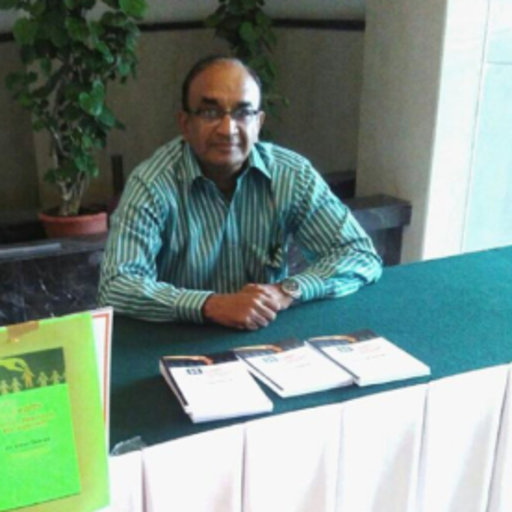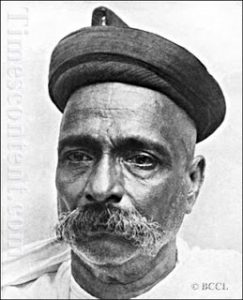Kumari Kandam
Dokras, Uday
 Uday Dokras is a prolific writer with a focus on Eastern religions and history. Many of his papers are available on the Academia website(a). He is reputed to have written the highest number of books and research papers! Included in his extensive output is a book entitled Atlantis – The Lost Continent. In it he reviews the subject of sunken cities and land both in the West and in the Orient, such as Kumari Kandam(b). His chapter on Atlantis offers little that is new and is simply a brief review of current theories.
Uday Dokras is a prolific writer with a focus on Eastern religions and history. Many of his papers are available on the Academia website(a). He is reputed to have written the highest number of books and research papers! Included in his extensive output is a book entitled Atlantis – The Lost Continent. In it he reviews the subject of sunken cities and land both in the West and in the Orient, such as Kumari Kandam(b). His chapter on Atlantis offers little that is new and is simply a brief review of current theories.
>He also produced a paper on the ancient lighthouse at Alexandria (Pharos)(c).
Arguably his most contentious offering is an extensive paper(d) on the existence of the vimanas of ancient India and Pakistan. He presents an array of evidence from Hindu scriptures and concludes with a review of modern writers and the unsuccessful attempts to design and build a vimana today using these old texts.
Although Dokras’ paper is worth a read, I suggest that it be undertaken along with the more critical responses of debunkers, such as, Jason Colavito has drawn attention to the fact that
“The concept of these flying chariots as UFO-style airships originates in a fraud, the Vaimanika Shastra, allegedly an ancient Sanskrit epic, but one “channeled” from the astral realm by a Hindu psychic in 1918. No evidence of this text exists prior to 1952, and even the “translator” of the text makes explicit that it was channeled from the spirit world between 1918 and 1923. The fake text specifically compares the vimanas to modern aircraft, describing their propulsion systems and other modern technological achievements.”(e) David Hatcher Childress’ story of the Vaimanika Shastra has been challenged elsewhere including an article by Andrew May(f).<
(a) https://su-se.academia.edu/DrUdayDokras
(b) https://www.academia.edu/95153127/ATLANTIS_The_lost_Continent_BOOK
(c) https://archive.org/stream/lighthouse-of-alexandria-book/Lighthouse%20of%20Alexandria-BOOK_djvu.txt *
(d) (99+) VIMANA Ancient Conquests of Wind | Dr. Uday Dokras – Academia.edu *
Tilak, Bal Gangadar
Bal Gangadar Tilak (1856-1920) was India’s first Independence Movement leader. He was greatly  impressed by William Fairfield Warren’s 1885 book, Paradise Found [078], which placed the cradle of humanity in the Arctic. So much so, that when Tilak wrote Arctic Home in the Vedas [1296]+, he proposed the Arctic Sea as the location of the Aryan homeland of ‘Airyana Vaêjo’.
impressed by William Fairfield Warren’s 1885 book, Paradise Found [078], which placed the cradle of humanity in the Arctic. So much so, that when Tilak wrote Arctic Home in the Vedas [1296]+, he proposed the Arctic Sea as the location of the Aryan homeland of ‘Airyana Vaêjo’.
Rand & Rose Flem-Ath have suggested that Tilak’s Airyana Vaêjo might have been a garbled version of the lost paradise of Kumari Kandam, which is traditionally located south of India. They then propose that since Antarctica is also south of India and covered with ice like Airyana Vaêjo, perhaps Tilak had chosen the wrong polar region and that the Aryan homeland had been Antarctica, which just happens to be the location of Atlantis according to the Flem-Aths!(a)?
[1296]+ Available online: https://www.rarebooksocietyofindia.org/book_archive/ID-1606385932.pdf *
(a) https://web.archive.org/web/20080607014518/https://www.flem-ath.com:80/kumari.htm
Kumari Kandam
 Kumari Kandam is the Tamil name given to a legendary sunken continent to the south of the Indian sub-continent(a) . It is claimed that it was finally submerged after two or three inundations and is frequently associated with the story of Lemuria and its parallels with Plato’s Atlantis have not gone unnoticed. The reality is that low-lying land in what is now the Indian Ocean was inundated at the end of the last Ice Age, just as the Celtic Shelf was submerged in the Atlantic and vast tracts of land in the Caribbean, giving rise to similar flood legends in all those areas.
Kumari Kandam is the Tamil name given to a legendary sunken continent to the south of the Indian sub-continent(a) . It is claimed that it was finally submerged after two or three inundations and is frequently associated with the story of Lemuria and its parallels with Plato’s Atlantis have not gone unnoticed. The reality is that low-lying land in what is now the Indian Ocean was inundated at the end of the last Ice Age, just as the Celtic Shelf was submerged in the Atlantic and vast tracts of land in the Caribbean, giving rise to similar flood legends in all those areas.
>>A more recent overview of the Kumari Kandam is available on the Ancient Origins website(b). Furthermore, a Asian site has reviewed the story of Kumari Kandam and concluded that “Kumari Kandam remains one of the most enigmatic and enduring myths in Tamil culture. While its existence as a physical landmass is doubtful, the legend of Kumari Kandam holds cultural and symbolic significance for the Tamil-speaking people. It represents an ancient civilization that is believed to have made significant contributions to human knowledge, philosophy, and art. For many, Kumari Kandam is not just a lost land but a reminder of Tamil heritage, resilience, and identity.
The myth of Kumari Kandam serves as a fascinating example of how ancient legends and modern cultural identity can converge. Whether seen as a historical possibility or a cultural construct, Kumari Kandam continues to inspire curiosity, pride, and debate within and beyond the Tamil community.” (c)<<
(a) https://mystiquearth.blogspot.com/2009/01/kumari-kandam-sunken-land-mass-from.html
(b) http://www.ancient-origins.net/myths-legends/lost-continent-kumari-kandam-001941 *
Sri Lanka
Sri Lanka, or more correctly an area to the south of that island, has traditionally been associated with a large submerged civilisation known in Tamil literature as Kumari Kandam. The idea was recently given added impetus in an interesting Internet posting(a). The writer points out that the proto-Greeks came from India, bringing with them their language and other listed cultural attributes, including the tales of sunken landmasses in the region of Sri Lanka. The Sanskrit texts predate Plato with accounts of advanced civilisation in India. More interesting is writing of Panini, a 4th century BC, Sanskrit grammarian who records Greeks in India. This fascinating subject is most certainly worthy of further investigation.
It is not unreasonable to link this lost civilisation with the inundation of Sundaland further east around today’s Indonesia.
